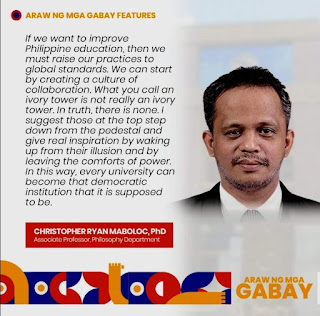Democracy in the Academe?
By Dr. Christopher Ryan Maboloc
There are different levels of influence in the world of academia. This helps us understand how knowledge and tradition are established in systematic thought and analytic thinking. For instance, Fr. Michael Moga has not published his works in scholarly journals, but his books have been the standard readings for over 50 years in many Mindanao schools, especially the three Ateneos. The same can be said for Luzon and Visayas scholars. Universities are actually protective of the legacy of their own intellectual giants.
This has changed as more young academics went abroad to study, especially when the European Commission offered the Erasmus Mundus scholarship program. It would be tough to measure the value of an academic output if the concept of tradition is employed today. It will take time and the same honor can only be reserved for very few people, who we young academics consider as 'gods'. But for mortals like us, we can only rely on peer evaluation to gauge our two cents worth.
If we intend to improve local scholarly work, schools should put an end to the "big fish, small pond" mindset. Some education leaders fail to truly recognize the impact of some academics because they rely on information that is based on internal mechanisms and policy. The thing is, those who are strict in terms of implementing the rules actually have no research output to show. School politics is not different from the outside world.
And then there's this crab mentality. Some will begin to cancel (yes, I am using the term) others, when they suggest that there's an obsession about getting published. There's none. It is just that there are talented people who do the job that God has given them as a matter of commitment while others wallow in their sense of insecurity. In fact, many scholars are active community leaders who also help LGUs in policy making.
If we want to improve Philippine education, then we must raise our practices to global standards. We can start by creating a culture of collaboration. What you call an ivory tower is not really an ivory tower. In truth, there is none. I suggest those at the top step down from the pedestal and give real inspiration by waking up from their illusion and by leaving the comforts of power. In this way, every university can become that democratic institution that it is supposed to be.



